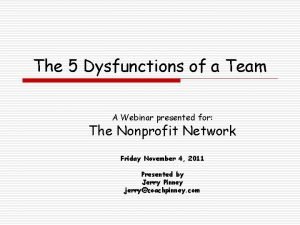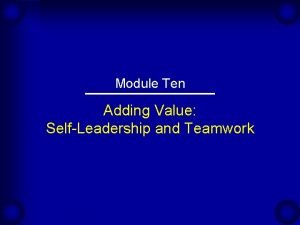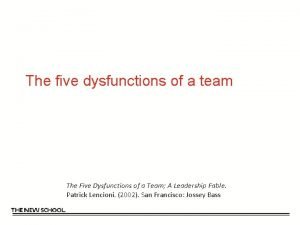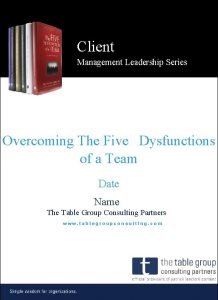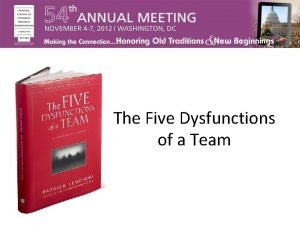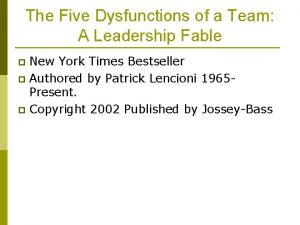Office of Research Leadership Workshop The Five Dysfunctions










- Slides: 10

Office of Research Leadership Workshop: The Five Dysfunctions of a Team Mary Lidstrom, Vice Provost for Research June 11, 2019 Based on the book, “The Five Dysfunctions of a Team” by Patrick Lencioni

Recap from last workshop § Organizations need to anticipate, direct and cope with changes within their organizational environments. § Proactive and progressive leaders, are able to ensure and maintain stability, survival, sustainability, and competitive edge within the rapidly changing higher education environment. Managing Change in an Organization, March 2015 Chaitanya Baliga, Ph. D. , ASQ-CQA/CMQOE/CSSGB

The Model

Absence of TRUST An unwillingness to be vulnerable and open with the team. Absence o f TRUST

Absence of TRUST Prior Negative Interactions within the team experience Absence o f TRUST

Fear of CONFLICT Failure to build trust sets the stage for the second dysfunction – Fear of Conflict. Fear of Co nflict

Lack of Commitment A lack of healthy conflict will always lead to a lack of commitment to the team. Lack of Co mmitmen t

Avoidance of ACCOUNTABILITY Because of the lack of commitment and therefore buy-in, team members develop an avoidance of accountability Avoidance of Accounta bility

Inattention to RESULTS Failure to hold team members accountable creates the next dysfunction – inattention to results. Inattentio n to results

What did Google discover about the Attributes of a Functional Team? • Effective teams had different “personalities”; no commonality there • All shared the common attribute that EVERYONE CONTRIBUTED ABOUT THE SAME AMOUNT • This is about trust • Also about risk-taking in the group How do you as a team leader ensure that everyone contributes? Based on the NYT article, “What Google Learned from its Quest to Build the Perfect Team”
 5 dysfunctions of a team powerpoint
5 dysfunctions of a team powerpoint 5 dysfunctions of a team questions
5 dysfunctions of a team questions Functions and dysfunctions of deviance
Functions and dysfunctions of deviance Spirizzy
Spirizzy Transactional leadership and transformational leadership
Transactional leadership and transformational leadership Adaptive leadership theory
Adaptive leadership theory Situational leadership vs adaptive leadership
Situational leadership vs adaptive leadership Five themes of leadership
Five themes of leadership Five sequential stages of self-leadership
Five sequential stages of self-leadership And all its aching joys are now no more
And all its aching joys are now no more Five of five
Five of five

